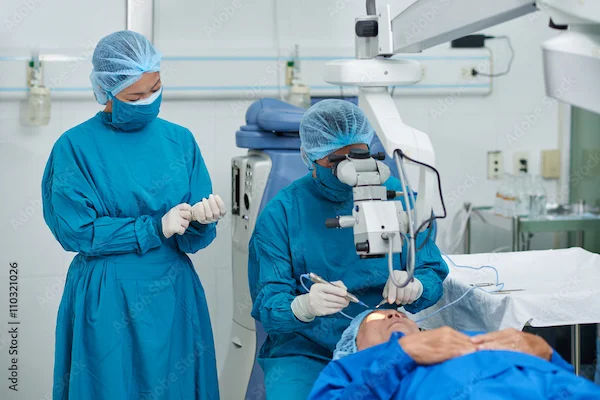How Long Is Cataract Surgery From Start To Finish?
Find out how long cataract surgery takes from start to finish, including pre-op preparation, the actual procedure, and post-op recovery time for a complete overview.

Written by
Last updated on 3rd Jul, 2025

Introduction
If you or a loved one has been diagnosed with cataracts, you may be wondering about the surgery, especially how long it takes. Cataract surgery is one of the most common and safest procedures performed worldwide, but it’s natural to feel a little anxious about what to expect.
In this article, we’ll walk you through the entire process, from pre-surgery preparations to recovery, so you can feel more confident and informed.
What Is Cataract Surgery?
Cataracts occur when the natural lens of your eye becomes cloudy, leading to blurry vision, difficulty seeing at night, and sensitivity to light. Cataract surgery involves removing this cloudy lens and replacing it with a clear artificial one (called an intraocular lens or IOL).
The procedure is quick, safe, and highly effective, with most patients experiencing significantly improved vision afterwards.
How Long Does Cataract Surgery Take?
The actual surgical procedure typically takes only about 10 to 20 minutes per eye. However, the entire process—from arrival at the hospital or clinic to going home—usually takes 2 to 3 hours. Here’s a breakdown of what happens during that time:
1. Pre-Surgery Preparation (30-60 minutes)
Before the surgery begins, you’ll go through a few steps:
Check-in & Paperwork: You’ll complete any necessary forms and confirm your medical history.
Eye Drops: Your eye will be numbed with anaesthetic drops to ensure you don’t feel pain during the procedure.
Pupil Dilatation: Special drops will widen your pupil so the surgeon can see the cataract clearly.
IV Sedation (if needed): Some patients receive mild sedation to help them relax, though you’ll remain awake.
2. The Surgery Itself (10-20 minutes per eye)
The surgeon will use a small incision to break up and remove the cloudy lens using ultrasound (a technique called phacoemulsification). They will then insert the new artificial lens.
You won’t feel pain, but you might notice some pressure or bright lights.
The surgeon may place a protective shield over your eye afterward.
3. Recovery & Observation (30-60 minutes)
After surgery, you’ll rest in a recovery area while the medical team ensures there are no immediate complications.
You’ll be given post-op instructions (like using prescribed eye drops).
Since you may still be slightly drowsy from sedation, you’ll need someone to drive you home.
To Know The Duration Of The Surgery Consult Top Ophthalmologists
What Happens After Cataract Surgery?
You’ll be able to go home the same day. Recovery is usually quick, but here’s what to expect:
First 24-48 Hours
Your vision may be blurry at first but should improve within a few days.
You may experience mild itching or discomfort, but avoid rubbing your eye.
Use the prescribed antibiotic and anti-inflammatory eye drops to prevent infection and swelling.
First Week
Avoid strenuous activities, swimming, or heavy lifting.
Wear the protective eye shield while sleeping to prevent accidental rubbing.
Attend your follow-up appointment to check healing progress.
Full Recovery (4-6 Weeks)
Most people notice significant vision improvement within days.
Your doctor will confirm when you can resume all normal activities.
Tips for a Smooth Recovery
To help your eye heal faster and avoid complications:
Follow your doctor’s instructions on medications and eye drops.
Avoid dusty or dirty environments that could irritate your eye.
Wear sunglasses outdoors to protect your eyes from bright light.
Don’t drive until your doctor confirms it’s safe.
When to Call Your Doctor?
While complications are rare, contact your doctor if you experience:
Severe pain or sudden vision loss
Increased redness or swelling
Flashes of light or floating spots
Conclusion
Cataract surgery is a quick, safe, and life-changing procedure that restores clear vision for millions of people every year. The actual surgery takes only 10-20 minutes, but you should plan for about 2-3 hours at the hospital or clinic.
If you’re considering cataract surgery, Apollo 24|7 makes it easy to consult with expert ophthalmologists and book your procedure with confidence.
Consult Top Ophthalmologists
To Know The Duration Of The Surgery Consult Top Ophthalmologists

Dr Rajesh Rastogi
Ophthalmologist
33 Years • MBBS, MS Ophthalmology
New Delhi
Rotary Diabetic Centre, New Delhi
Dr. S Venkateswaran
Ophthalmologist
35 Years • MBBS, PGD (OPTHALMOLOGY)
Tiruvannamalai
Shiva Eye And General Hospital, Tiruvannamalai
(25+ Patients)

Dr. Sneha T Khurana
Ophthalmologist
9 Years • MBBS, MS Ophthalmology
Gurugram
GS multispeciality clinic, Gurugram
Dr. Akashdipta Saha
Ophthalmologist
4 Years • MBBS, MD(Ophthalmology), Fellowship in Retina & Vitreous
Delhi
AIIMS, Delhi
Dr. Harshavardhan Reddy
Ophthalmologist
3 Years • MBBS , MS (Ophthalmology)
Hyderabad
Ram Dev Rao Hospital, Hyderabad
Consult Top Ophthalmologists

Dr Rajesh Rastogi
Ophthalmologist
33 Years • MBBS, MS Ophthalmology
New Delhi
Rotary Diabetic Centre, New Delhi
Dr. S Venkateswaran
Ophthalmologist
35 Years • MBBS, PGD (OPTHALMOLOGY)
Tiruvannamalai
Shiva Eye And General Hospital, Tiruvannamalai
(25+ Patients)

Dr. Sneha T Khurana
Ophthalmologist
9 Years • MBBS, MS Ophthalmology
Gurugram
GS multispeciality clinic, Gurugram
Dr. Akashdipta Saha
Ophthalmologist
4 Years • MBBS, MD(Ophthalmology), Fellowship in Retina & Vitreous
Delhi
AIIMS, Delhi
Dr. Harshavardhan Reddy
Ophthalmologist
3 Years • MBBS , MS (Ophthalmology)
Hyderabad
Ram Dev Rao Hospital, Hyderabad




